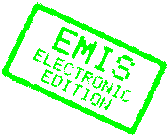Permutation Groups, a Related Algebra and a Conjecture of Cameron
Julian D. Gilbey
DOI: 10.1023/B:JACO.0000022565.73260.86
Abstract
We consider the permutation group algebra defined by Cameron and show that if the permutation group has no finite orbits, then no homogeneous element of degree one is a zero-divisor of the algebra. We proceed to make a conjecture which would show that the algebra is an integral domain if, in addition, the group is oligomorphic. We go on to show that this conjecture is true in certain special cases, including those of the form H Wr S and H Wr A, and show that in the oligormorphic case, the algebras corresponding to these special groups are polynomial algebras. In the H Wr A case, the algebra is related to the shuffle algebra of free Lie algebra theory.
Pages: 25–45
Keywords: oligomorphic permutation groups; integral domains; shuffle algebras; random graph; random tournament; Lyndon words
Full Text: PDF
References
1. P.J. Cameron, “Orbits of permutation groups on unordered sets, II,” J. London Math. Soc. (2) 23 (1981), 249-264.
2. P.J. Cameron, Oligomorphic Permutation Groups, Cambridge University Press, 1990.
3. P.J. Cameron, “The algebra of an age,” in David M. Evans, (ed.), Model Theory of Groups and Automorphism Groups, Cambridge University Press, 1997, pp. 126-133.
4. W.M. Kantor, “On incidence matrices of finite projective and affine spaces,” Mat Z. 124 (1972), 315-318.
5. P.M. Neumann, “The structure of finitary permutation groups,” Arch. Math. (Basel) 27 (1976), 3-17.
6. C. Reutenauer, Free Lie Algebras, Oxford University Press, 1993.
2. P.J. Cameron, Oligomorphic Permutation Groups, Cambridge University Press, 1990.
3. P.J. Cameron, “The algebra of an age,” in David M. Evans, (ed.), Model Theory of Groups and Automorphism Groups, Cambridge University Press, 1997, pp. 126-133.
4. W.M. Kantor, “On incidence matrices of finite projective and affine spaces,” Mat Z. 124 (1972), 315-318.
5. P.M. Neumann, “The structure of finitary permutation groups,” Arch. Math. (Basel) 27 (1976), 3-17.
6. C. Reutenauer, Free Lie Algebras, Oxford University Press, 1993.
